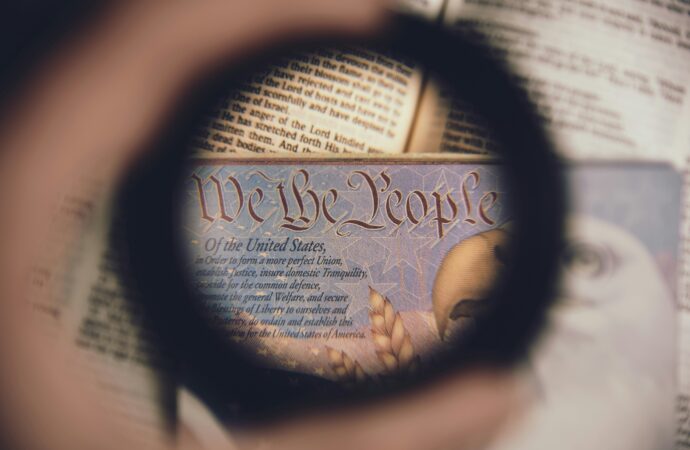Back in the 1980s, writer Florence King began her essay “Democrazy” by recounting a scene from the 1946 Japanese war trials. At one point, the former propaganda minister, Shumei Okawa, leaped to his feet and cried out: “I hate United States! It is democrazy!”
That unintended pun is the theme for King’s piece, which appears in her book “Reflections in a Jaundiced Eye.” That same theme – the craziness of democracy and its foibles – can be found throughout King’s other essays, all written with a wit that makes a razor seem dull.
To read King’s 40-year-old criticisms of American democrazy is disheartening but amusing because time and technology have led our society and politics far deeper into the bowels of the looney bin. Her Reagan-era acerbic complaints about American culture are the stuff of innocence today, inklings to the plague of madness that has beset the 21st century.
Near the end of her article, King brings into play Sharawaggi, a term for landscaping and gardens which she uses to mean “irregular or asymmetrical.” She then writes:
Sharawaggi has overtaken America. The idea that nobody is better than anybody else has given rise to the belief that it is impossible to give offense in a democratic society. The habit of personal restraint that marks civilized societies has been so thoroughly eroded by egalitarianism that we are coming to resemble revolutionary France….
Some 40 years later, many, possibly all, Americans are carriers of this virus, Sharawaggi, which brings about the debilitating civilizational disease, democrazy. Yet there are treatments available with remarkable curative and preventive powers for fighting this epidemic.
Civility
The name-calling, profanity, ad hominem assaults, and no-longer-rare threats against life and limb: these are now part of our national conversation. Whether conducted on social media, in personal conversations, or in the public arena, respect for the humanity of others is often missing in action.
“Politeness is manners, it’s technique, it’s etiquette, it’s behavior, it’s at the superficial, external level alone,” author Alexandra Hudson says. She continues:
But civility is a disposition of the heart. It’s a way of seeing others as our moral equals and treating them with the respect that they’re owed and deserve. In light of that—and this is key—sometimes actually respecting someone requires being impolite. It means telling a hard truth, engaging in robust debate, telling someone that you disagree, that you think that they’re wrong.
The old saying, “Hate the sin, not the sinner,” applies here. We can vehemently disagree with someone promoting more government spending or sexual practices with which we disagree, but civility demands we see our opponent as a person.
Common Sense
“State a moral case to a ploughman and a professor. The former will decide it as well and often better than the latter, because he has not been led astray by artificial rules.”
That Thomas Jefferson quote introduces the first chapter in Robert Curry’s “Reclaiming Common Sense.” Curry addresses the absolute necessity for truth and reality in making judgments and determining policies, yet all too often “artificial rules” have held sway, he says. Citing historian Allen Guelzo, Curry writes that “prior to the Civil War, ‘every major [American] collegiate intellectual’ subscribed to that philosophy.”
Curry then bluntly states a truth we need to carry with us everywhere: “Political correctness is quite simply a war on common sense. It is a war by the elites on the common people and on the shared understanding of basic realities of life….”
Jefferson’s professor and his artificial rules may sit high in the saddle, declaring that men can become women or that $38 trillion dollars of debt should remain unaddressed, but we need not follow. We should apply common sense to our own lives, laughing that rider off his horse.
Citizenship
It’s not just the tidal wave of immigrants let into the country by the Biden administration that has undermined the ideal of American citizenship. The enormous amount of corruption in our government, particularly at the federal level, reveals a contempt for real citizenship. Look at our politicians. Most push a personal cause rather than asking, “Is it good for America?”
Furthermore, those who assail America for her past wrongs rarely note that the country has righted many of those wrongs, ignoring altogether the good done by our republic. These are the killers of citizenship.
We can fight this trend by making ourselves better citizens. Read and study the Constitution, strive to learn more about our history and the men and women who shaped the past which gave us our present. As for the future, we can keep an eye on events, protesting loudly when our American freedoms are threatened.
Add this triple dose of vitamin C to your day. You’ll feel better, and you’ll also bring some light to the asylum.
—
This article was made possible by The Fred & Rheta Skelton Center for Cultural Renewal.
Image credit: Unsplash
















Leave a Comment
Your email address will not be published. Required fields are marked with *